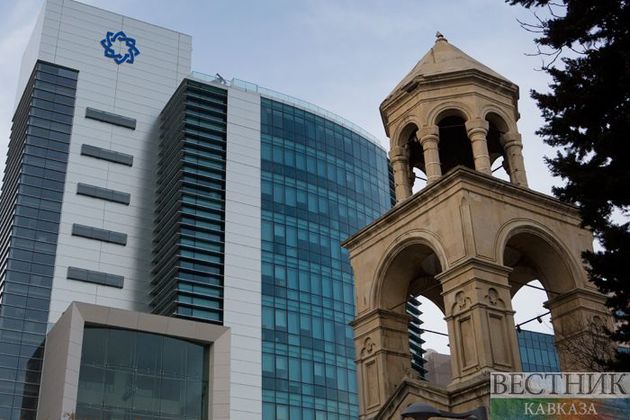When former Israeli Foreign Minister Tzipi Livni sent birthday wishes on December 23 to Azerbaijani President Ilham Aliyev, she praised Aliyev for leading Azerbaijan “through national and international challenges.” Given the recent events in Eurasia’s South Caucasus region, Livni’s words carry far more than ceremonial meaning. As San Diego Jewish World writes, Armenia last month signed a surrender document which ended a six-week war with Azerbaijan. According to the Russian-brokered ceasefire, Armenia agreed to withdraw from territories in Nagorno-Karabakh which it had occupied for three decades, while Russian peacekeepers are now patrolling the region. Through its historic victory in the war, Azerbaijan has regained control of approximately 20 percent of its internationally recognized territory.
Four U.N. Security Council resolutions affirm the territory of Nagorno-Karabakh as part of Azerbaijan. According to the UNHCR (the U.N. refugee agency), more than 620,000 Azerbaijanis were displaced from their homeland in Nagorno-Karabakh and only now have an opportunity to return following the end of Armenian occupation.
Of particular significance to Azerbaijanis is reclaiming Shusha, the city once known as “the Conservatory of the Caucasus,” which had fallen to the Armenian occupation in May 1992. Under its previous era of Azerbaijani control, Shusha grew “to become a significant political, economic, and cultural center in the entire region,” wrote Aybaniz Ismayilova, a representative of the Azerbaijani Community of Nagorno-Karabakh, for the San Diego Jewish World earlier this year. Today, Azerbaijanis’ joy around reclaiming Shusha mirrors world Jewry’s sentiments surrounding the reunification of Jerusalem under Israeli control in 1967.
The recent war over Nagorno-Karabakh was instigated on September 27 when Armenian armed forces, using large-caliber weapons, mortar launchers, and artillery, launched attacks against positions of Azerbaijan. Yet media commentators commonly described Azerbaijan as the “aggressor” during the war, and they continue to do so following the conflict. Armenia is generally depicted as an ancient, tiny Christian nation under threat from Muslim-majority Azerbaijan in a war between religions.
Claims of religious warfare in Nagorno-Karabakh disregard Azerbaijan’s status as a pioneer in developing Muslim relations with the Jewish community and Israel, and according to Gallup, one of the world’s most secular countries. This past April, Rev. Johnnie Moore, commissioner of the United States Commission on International Religious Freedom (USCIRF), issued a dissenting opinion on the recommendation in USCIRF’s 2020 report to include Azerbaijan on the State Department’s “Special Watch List” for violators of religious freedom. Moore’s dissent noted that Azerbaijan “is a country where Sunni and Shi’a clerics pray together, where Evangelical and Russian Orthodox Christians serve together, and where thriving Jewish communities enjoy freedom and total security in their almost entirely Islamic country.”
The Southern California-based pastor added, “Azerbaijan has had the challenge of bringing religious freedom into a post-Soviet legal framework, but — even in this — it has achieved much more than any of its neighbors.”
While accusations of “cultural genocide” against Nagorno-Karabakh’s churches and Christian heritage have followed Azerbaijan since the end of the war, Azerbaijani presidential foreign policy advisor Hikmet Hajiyev noted that during its three decades of independence, Azerbaijan “has shown the world its commitment to restoration of our multi-faith heritage.”
“Baku’s Armenian cathedral, damaged in the chaos of 1990, has been fully restored, now housing a library of some 5,000 precious Armenian manuscripts,” Hajiyev wrote for The Washington Times. “The head of the Armenian Church has been a welcome visitor to the cathedral. A new, Catholic cathedral has been constructed on land donated by the government, and opened by the Pope. Old synagogues have been restored and re-opened, and new Jewish schools have been built.”
Foreign Minister Jeyhun Bayramov, meanwhile, said this week that Azerbaijan “is determined to reintegrate citizens with Armenian origin living in Nagorno-Karabakh into the country’s social and economic space.”
In 2017, Azerbaijan hosted its annual Formula 1 Grand Prix race on the eve of Eid al-Fitr, the holiday that marks the end of the Islamic holy month of Ramadan. That convergence of religious and secular festivities is strongly indicative of Muslim-majority Azerbaijan’s prioritization of religious freedom. In fact, Azerbaijan was the first parliamentary republic to be established in the Muslim world. The Azerbaijan Democratic Republic was founded in 1918 and collapsed in 1920 when Vladimir Lenin’s Russia invaded Azerbaijan. In 1991, Azerbaijan regained independence with the collapse of the Soviet Union. Just one year later, Azerbaijan and Israel formed an alliance which is often described as an “improbable romance” between Muslims and Jews.
The Azerbaijan-Israel relationship continues to flourish in the economic, cultural, and security arenas, and serves as a historical precursor to this year’s fast-growing normalization of ties between Israel and Arab countries. Prime Minister Benjamin Netanyahu perhaps put it best during his visit to Azerbaijan in 2016, calling Israeli-Azerbaijani ties “something that we can show the world.” Livni echoed that sentiment in her comments this week, calling Azerbaijani religious tolerance “a source of inspiration to many.”






